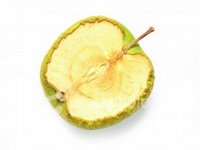Why do apples turn brown after you break the skin?
 It stinks when that happens, doesn't it? The fruit that Cezanne's still lifes lifted out of the mundane; the fruit that, upon daily consumption, keeps the doctor or the dentist away depending where in the world you are -- marred by mean old Mr. Oxidation. There's your culprit.
It stinks when that happens, doesn't it? The fruit that Cezanne's still lifes lifted out of the mundane; the fruit that, upon daily consumption, keeps the doctor or the dentist away depending where in the world you are -- marred by mean old Mr. Oxidation. There's your culprit.Breaking the skin damages some of the apple's millions of cell walls, exposing their insides to the air. Oxygen then mixes with "phenols," a type of chemical compound. An enzyme called polyphenol oxidase (PPO) accelerates the process, creating what is called enzymatic browning. The color results from the creation of pigments called melanins. While apple-eaters may not like sinking their teeth into the mushy bruised
spots, enzymatic browning does serve a purpose, protecting fruit from insects, bacteria, and fungi.
Even just dropping an apple can break its cell walls, triggering oxidation. One way to prevent browning is to keep the PPO enzyme from mixing with oxygen by placing exposed apples in water. You can also slow the process by immersing the fruit in lemon, orange, or pineapple juice, as the vitamin C they contain is an antioxidant. Cooking the fruit will also stave off browning awhile, but using a rusty knife or
copper bowl will quicken it. Don't forget: Pears, bananas, peaches,and potatoes also bruise easily. So be gentle.
Receive post updates by Email



























 Add my feed to your Rss
Add my feed to your Rss
